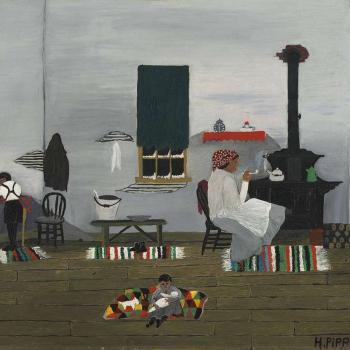
“No human being escapes the necessity of conceiving some good outside himself towards which his thought turns in a movement of desire, supplication, and hope. consequently, the only choice is between worshipping the true God or an idol. Every atheist is an idolater — unless he is worshipping the true God in his impersonal aspect. The majority of the pious are idolaters.” – Simone Weil
Harsh words, but important ones, at least for myself, if not for others. The fact is that while I consider myself a Christian, quite often I am worshiping something or someone else—be it my own desires, my pride, or myself. Of course, I like certain things. Sometimes I sit down with friends and say I want to watch a certain movie. Sometimes I decide I want this food or that one, no matter what the effects on my health. Sometimes I get angry, lose myself (or perhaps one might say worship myself), and mistreat those around me all because I have not gotten what I wanted.
We do like things. We do enjoy things. This is true. But what we seek in things is our own desire. Our preferences are rooted in ourselves. When I don’t get what I want, I become angry not because I truly care about the thing in question, but because (and here comes a tautology) I have not gotten my way. The smaller the things , (paradoxically) the fiercer the discontent.
This is a sort of idolatry, a perfidious worship of self that I constantly allow to rage in my heart. Many of us probably do, but it is only right for me to speak for and of myself. Simone Weil writes that we cannot help but conceive some good outside of ourselves to worship—whether the King of kings or an idol. I might take that a step further: we create idols by worshiping ourselves, projecting our desires onto the world, deforming it, paying heed only to what we want, not what is wanted of us.
At moments, this may seem harmless enough. Indeed, at times it is—wanting this flavor of ice cream or that color carpet. Preferences are unavoidable, a part of what it means to be human. But if we allow this idolatry of self to take root too fully, too deeply, we run the risk of injustice.
Idolatry may not sound like a question of injustice. Injustice smacks of our legal system, or merely of the idea that something has been done to us, something we don’t deserve (and, of course, there are many cases in which people are treated very unjustly). But here I mean the word in a different sense, Idolatry is injustice because it forecloses our relationship to God and neighbor. We might reach out to others; we might think we are doing right, but as long as our desire remains rooted in and for ourselves, we cannot help but mistreat them.
The Prophet Jeremiah had much to say in this regard. Here are two related (and proximate) pronouncements of his (really of the Lord’s) on justice and right worship:
To the royal house of Judah:
Hear the word of the LORD,
house of David!
Thus says the LORD:
Each morning dispense justice,
rescue the oppressed from the hand of the oppressor,
Or my fury will break out like fire
and burn with no one to quench it
because of your evil deeds.
Beware! I am against you, Ruler of the Valley,
Rock of the Plain—oracle of the LORD.
You say, “Who will attack us,
who can storm our defenses?”
I will punish you—oracle of the LORD—
as your deeds deserve!
I will kindle a fire in its forest
that shall devour all its surroundings.
(Jeremiah 21:11-14)













